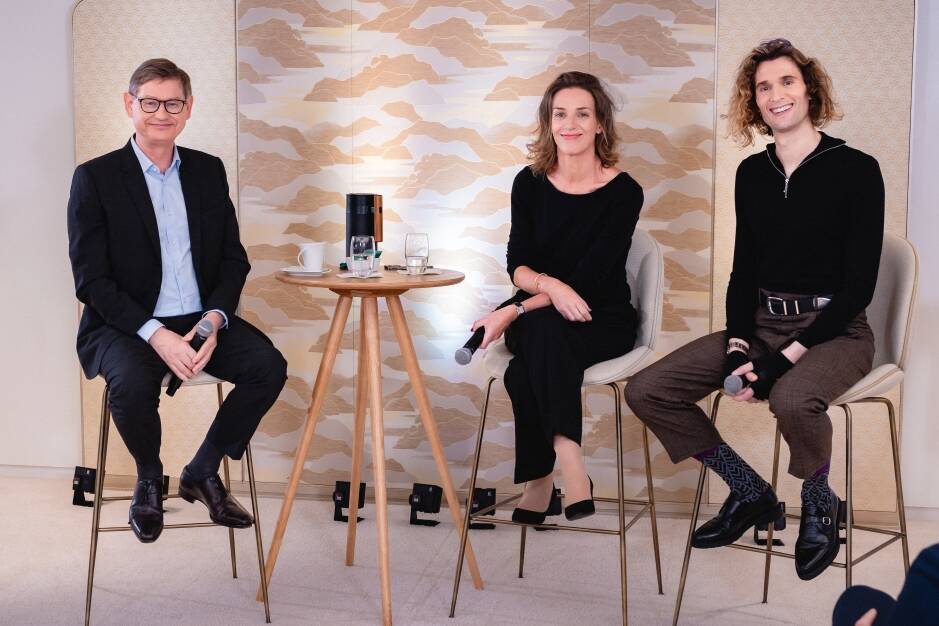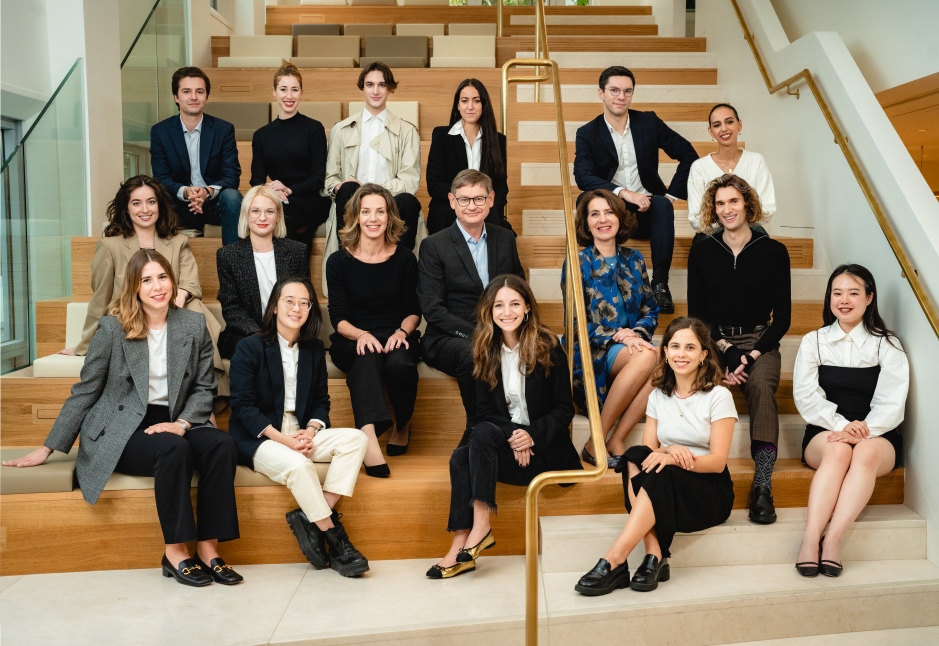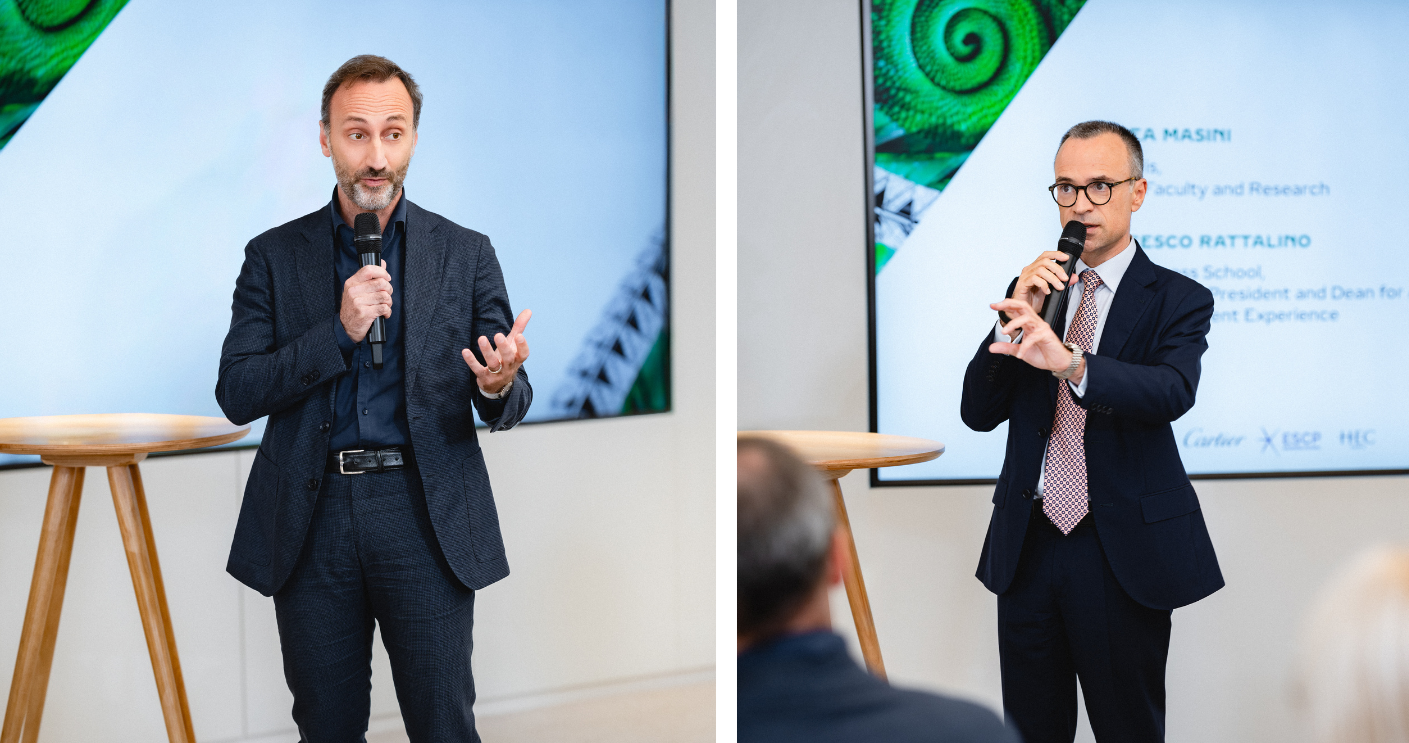Knowledge is not enough to handle misinformation
“(Mis)information, truth and knowledge”, was the theme of the academic dialogue between Cyrille Vigneron, President and CEO of Cartier, and the two scientific directors of the ‘Turning Points’ Chair, HEC Paris Professor Anne Laure Sellier and ESCP Professor Benjamin Voyer. The October 5 roundtable at Cartier’s headquarters in Paris highlighted how the adoption of critical thinking and a scientific approach were essential weapons in the fight against misinformation, a challenge that befalls us all as it widens the divide in society.

Cyrille Vigneron, President and CEO of Cartier, HEC Paris Professor Anne Laure Sellier and ESCP Professor Benjamin Voyer
For a Chair interested in contemporary societal issues and their turning points, notably on the subjects of truth and misinformation, 2016 is certainly a pivotal year to look back on. The Brexit vote and the election of Donald Trump illustrate not only the rise of populism, but also of our becoming aware with the deleterious effects of misinformation. In that context the Oxford Dictionaries named 'Post-truth' as its international word of the year. Describing a situation ‘in which objective facts are less influential than appeals to emotion’, it marked the advent of a pervasive threat of misinformation.
This phenomenon has dramatically increased in the wake of the COVID-19 pandemic, creating another phenomenon known as infodemic (too much information including false or misleading information in digital and physical environments during a disease outbreak). Seven years on, major international institutions such as the OECD or the World Economic Forum identified misinformation and disinformation as some of the biggest threats to democracy in the 21st century. The very perception of truth and scientific knowledge are called into question. How do researchers and business leaders deal with these issues? What are the responsibilities of higher education institutions and companies?
To mark the third year anniversary of the Cartier, ESCP and HEC Paris “Turning Points – Aspiration to Inspiration” Chair, Cartier President and CEO Cyrille Vigneron led a stimulating discussion with chair co-directors Anne Laure Sellier (HEC Paris Professor of Behavioral Sciences) and Ben Voyer (ESCP Professor of Behavioral Science) on the challenges the current information environment poses. Students from the Gen Z Observatory, as well as employees from Cartier and both business schools turned out in numbers to follow the debate.
Knowledge is Our Business Too
Hosting the event at Cartier’s headquarters in Paris, Cyrille Vigneron stated that questions around truth and knowledge should also be considered critical by companies as the new information challenges we face today require a collective response. Vigneron advocated for more bridges between the corporate and the academic world so that we can learn from researchers and work together on questions that really matter.
This both illustrates the ambition of the Cartier Chair - to share a culture of research and inspire the Maison Cartier to face the current and future challenges -, and Cyrille Vigneron’s own conviction on the need to foster greater dialogue between business and education leading to more concrete and lasting impact.
Stop and Think
In the course of the debate, it turned out that citizens and researchers face similar challenges. On the one hand, citizens are suffering from information overload when trying to make sense of the news, form opinions and participate in public debate. On the other, researchers are “showered with data” as Anne-Laure Sellier pointed out. Neither parties have time to process this amount of information: “We hardly take time to think critically about incoming information, despite it being the one thing we need to do to counter misinformation”, she added.
Why do people share fake news? According to Anne-Laure Sellier, “Sharing is fundamental to humankind and we all aim at sharing truth and knowledge but that’s impossible” as people are bombarded with news. While scrawling at top speed through our social media feeds, they do not take the time to think about what they are sharing and weigh up what’s true or not. She proceeded to share a 2021 study by MIT Professor David Rand, which shows that shifting peoples’ attention toward accuracy and helping them become more discerning about the veracity of the information they share on social media can reduce the spread of misinformation by half. “The problem is not so much that people don’t care about the truth or want to purposely spread fake news; it’s that social media makes us share things that we would think better of if we stopped to think,” writes Professor Rand. We need more time to do so, and in our ever faster-paced working environments, it is perhaps time to design slowing down, suggests Anne Laure Sellier.
Advocating respect for the long-term nature of research, as well as the need to carefully choose and analyze and sift through a huge volume of data, Anne-Laure underlined that seven years of research on misinformation since the 2016 US Presidential elections was very little on the time scale of research. From this point of view, the virtue of this Chair is to support this long-term thinking, in order to have an impact on business and society.
Fact-checkers are Critical Thinkers
"I'm not going to teach you facts". This is how Ben Voyer, professor at ESCP, traditionally welcomes his new students, eliciting a certain degree of surprise in the classroom. Justifying this approach to the conference audience he added: “Facts get outdated. I am here to teach them to think independently and critically”.
Critical thinking is the best way to deal with the amount of news we are exposed to, he continued, underlining the importance to engage in the right way. “Sometimes we don’t need the truth to explain that the more we question ourselves, the closer we get to the truth. That’s the journey of critical thinkers.”
Misinformation as an Indicator of a Fragmented Society
“The lack of perspective-taking is key to understand the phenomenon of misinformation,” according to Professor Voyer, referring to how the way people think can be biased by many social factors. Being aware of this phenomenon should lead them to be open to other points of view. “We think too much in silos in our society”, he declared. On several occasions, Voyer reiterated how crucial he felt it was for everyone to try and put themselves in other people's shoes, to understand each other better. A message particularly well received by the young people in the audience.
Beyond political or technical solutions related to platform regulation in the fight against misinformation, Voyer argued that building bridges between people and cultures that ordinarily don’t speak to each other is key. He mentioned the psychology theory of ‘contact hypothesis’, which suggests that allowing members from different groups to interact with one another reduces prejudices and, as such, is a way of improving relations between conflicting groups and “can bring people to converge.”
Science and Truth
Keen to clarify the terms of the debate, Professor Anne-Laure Sellier defined misinformation as follows: anything that goes against what is commonly accepted as being currently consensual among scientists, or mathematically agreed upon. A scientific consensus is established on a body of verifiable evidence, accepted by the scientific community at a certain time according to the knowledge available in a given discipline.
What about the concept of truth? Science does not establish a single, fixed truth that will hold over time. Scientific knowledge evolves and any scientific truth is therefore true only as long as it is not invalidated by new evidence forging a new consensus. For Sellier, this relationship with truth places the researcher in a very humble position — it is typical for scientists to entertain several “truths”, while pushing forward the most consensual theory at a given time. In that sense, aside from black-and-white knowledge (e.g., the Earth is round), the truth about grey knowledge areas is a continuously moving target.
The Cost of Misinformation
While science is based on evidence, misinformation allows the reign of opinions, not to mention conspiracy theories. The COVID-19 outbreak has been accompanied by an overabundance of information (infodemic), some accurate and some not – qualified by the World Health Organization (WHO) as “mak(ing) it hard for people to find trustworthy sources and reliable guidance when they need it”. Against the scientific consensus, the circulation of conspiracy theories, fake news or fake science can have real life consequences, as underlined by Sellier. To illustrate her point, she mentioned a Canadian report suggesting that false information about COVID 19 was found to be responsible for at least thousands of deaths in Canada. Other studies have similarly shown that fake news costs lives.
More broadly speaking, misinformation entails threats to the cohesion of our societies. “We need to create a universal language”, underlined Anne-Laure. “If it’s not science, what alternative do you suggest?”
Teaching how to Think and Research with Impact
For Andrea Masini, HEC Paris Dean of Faculty and Research, there is no doubt that the threat posed to our societies by misinformation must also be seen as an opportunity to strengthen science: “Investing in research gives us a unique advantage. As a research school, we have the opportunity to fight fake news with data”.
“We also have an incredible responsibility toward our students”, he added, underlining that access to knowledge is key, but that equipping students with theory and critical thinking to process it is more fundamental. It’s about training HEC students on how “to think” and how “to use their brains”.
In the same vein, the ESCP Business School Executive Vice-President, Francesco Rattalino, quoted Plato's allegory of the cave to underline the need to “challenge the knowledge that is presented to us”. He added that knowledge produced by scholars is not enough, “if it is not actionable”. “To fulfill our mission, we need to make an impact on the world”, he declared. The Cartier, ESCP and HEC Paris Chair illustrates “actionable research to make the difference”.

